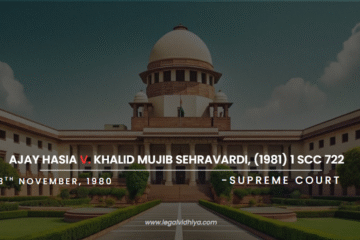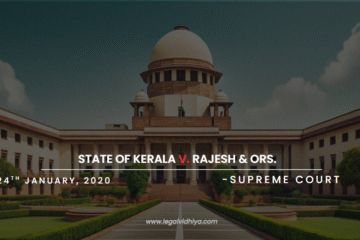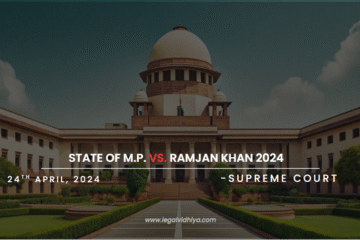
Sayed Mohd. Ahmed Kazmi vs State, Gnctd & Ors.
Case Name : | Sayed Mohd. Ahmed Kazmi vs State, Gnctd & Ors |
| Equivalent Citation: | AIR 2012 SC 660 |
| Date of Judgement: | 19 Oct 2012 |
| Court: | Supreme Court of India |
| Case No.: | CRIMINAL APPEAL NOS.1695-1697 OF 201 |
| Case Type : | Criminal Application |
| Petitioner: | SAYED MOHD. AHMED KAZMI |
| Respondent: | STATE, GNCTD & ORS. |
| Bench: | Hon’ble Chief Justice of India Altamas Kabir |
| Refered: | THE UNLAWFUL ACTIVITIES (PREVENTION) ACT, 1967 The National Investigation Agency Act, 2008 Code of Criminal Procedure, 1973. |

FACTS OF THE CASE
On 13th February 2012, an explosion occurred involving an Israeli Embassy vehicle carrying the wife of an Israeli Diplomat in Delhi. Sayed Mohd. Ahmed Kazmi was apprehended on 6th March 2012 in connection with the above incident. The police custody of Kazmi was initially extended by the Chief Metropolitan Magistrate, and later the remand period was further extended. On 25th March 2012, the investigating agency completed its investigation and informed the magistrate that no further custodial interrogation of Kazmi was required. Kazmi’s application for bail was rejected on 3rd April 2012, and various proceedings related to the case were conducted subsequently. On 2nd June 2012, the Chief Metropolitan Magistrate extended the period of investigation and custody of Kazmi by another 90 days. The order of the Chief Metropolitan Magistrate was challenged by Kazmi before the Additional Sessions Judge, who held that only the Sessions Court had the competence to extend the judicial custody of the accused. On 22nd June 2012, the Chief Judicial Magistrate extended Kazmi’s custody, and subsequently, a fresh application for extension of custody was filed by the prosecution. On 20th July 2012, the Chief Metropolitan Magistrate extended the time of interrogation and custody of Kazmi for 90 days with retrospective effect from 2nd June 2012. Kazmi challenged the order of the Chief Metropolitan Magistrate through a revision application filed in the Sessions Court.
ISSUES RAISED
- Whether the Chief Metropolitan Magistrate had the authority to extend the period of custody of the accused beyond 90 days for offenses under the Unlawful Activities (Prevention) Act, 1967.
- Whether the accused was entitled to statutory bail under Section 167(2) of the Code of Criminal Procedure, 1973, after the expiration of the initial 90-day custody period.
CONTENTIONS OF THE PETITIONER
In the case of Sayed Mohd. Ahmed Kazmi vs. State, GNCTD & Ors., the petitioner (Sayed Mohd. Ahmed Kazmi) and the respondent (State, GNCTD & Ors.) presented their arguments before the Supreme Court of India on 19th October 2012. The following are the key arguments put forth by each party:
Arguments of the Petitioner
- The petitioner’s custody had exceeded the period of 90 days, as stipulated under Section 167(2) of the Code of Criminal Procedure (Cr.P.C.).
- The Additional Sessions Judge had declared the petitioner’s custody to be illegal.
- The petitioner’s application for statutory bail under Section 167(2) Cr.P.C. was pending before the Chief Metropolitan Magistrate on 17th July 2012.
- The subsequent application for extension of custody filed by the prosecution on 18th July 2012 did not negate the petitioner’s right to statutory bail.
- The amended provisions of Section 167(2) Cr.P.C., as modified by Section 43D of the Unlawful Activities (Prevention) Act, 1967, allowed for a maximum period of 180 days for custody and filing of charges.
- However, in this case, the initial 90-day period had already lapsed without an application for extension pending.
CONTENTION OF THE RESPONDENT
In the case of Sayed Mohd. Ahmed Kazmi vs. State, GNCTD & Ors., the petitioner (Sayed Mohd. Ahmed Kazmi) and the respondent (State, GNCTD & Ors.) presented their arguments before the Supreme Court of India on 19th October 2012. The following are the key arguments put forth by each party:
Arguments of the Respondent:
- The prosecution sought further extension of the petitioner’s custody beyond the initial 90-day period.
- The High Court had issued notice to determine the competence of the Chief Metropolitan Magistrate to remand the accused beyond 15 days for offenses under the Unlawful Activities (Prevention) Act, 1967.
- The case involved the interpretation of provisions from the National Investigation Agency Act, 2008, the Code of Criminal Procedure, 1973, and the Unlawful Activities (Prevention) Act, 1967.
- The High Court had modified its earlier order and directed the Chief Metropolitan Magistrate to extend the remand of the accused and take cognizance of offenses under the Unlawful Activities (Prevention) Act, 1967.
- The High Court rejected the petitioner’s prayer for early hearing due to a heavy caseload.
JUDGEMENT
The Supreme Court of India analyzed the provisions of the Unlawful Activities (Prevention) Act, 1967, the National Investigation Agency Act, 2008, and the Code of Criminal Procedure, 1973. The Court held that the Chief Metropolitan Magistrate did not have the authority to extend the period of custody beyond 90 days for offenses under the Unlawful Activities (Prevention) Act, 1967. The Court further ruled that once the 90-day period expired, the accused was entitled to statutory bail under Section 167(2) of the Code of Criminal Procedure, 1973. The Court observed that the modified provisions of Section 167(2) Cr.P.C., as per the Unlawful Activities (Prevention) Act, allowed for a maximum custody period of 180 days, subject to certain conditions. However, in this case, the period of 90 days had already expired when the Chief Metropolitan Magistrate extended the custody of the accused.
CONCLUSION
The case “Sayed Mohd. Ahmed Kazmi vs State, Gnctd & Ors” was heard in the Supreme Court of India. The appellant, Sayed Mohd. Ahmed Kazmi, had been arrested in connection with an explosion involving an Israeli Embassy vehicle. The case revolved around the interpretation of various provisions of the law, including the Unlawful Activities (Prevention) Act, 1967, the National Investigation Agency Act, 2008, and the Code of Criminal Procedure, 1973. The appeals were filed against three orders passed by the Delhi High Court. The first order issued notice on the question of whether the Court of the Chief Metropolitan Magistrate had the authority to remand the accused beyond 15 days for offenses under the Unlawful Activities (Prevention) Act. The second order modified the earlier order and directed the Chief Metropolitan Magistrate to extend the remand of the accused and take cognizance of offenses under the same act. The third order rejected the appellant’s prayer for early hearing due to the heavy workload of the court. During the hearing of the appeals, another important question arose regarding the grant of statutory bail under Section 167(2) of the Code of Criminal Procedure. The appellant had filed an application for statutory bail as no charge-sheet had been filed within the prescribed 90-day period of custody. The appellant’s counsel argued that once the 90-day period of custody ended, the right to be released on statutory bail commenced and could not be extinguished by a subsequent application for extension of custody. They contended that the custody of the appellant had been declared illegal, and therefore, the application for extension of custody filed by the prosecution did not improve the matter. The court considered the modified provisions of Section 167(2) of the Code of Criminal Procedure, as introduced by the Unlawful Activities (Prevention) Act, 1967. According to the modified provisions, if the investigation could not be completed within 90 days, the court, upon being satisfied with the progress of the investigation and the specific reasons for the extended detention, could extend the custody for up to 180 days.
written by Tushar Khandekar intern under legal vidhiya




0 Comments